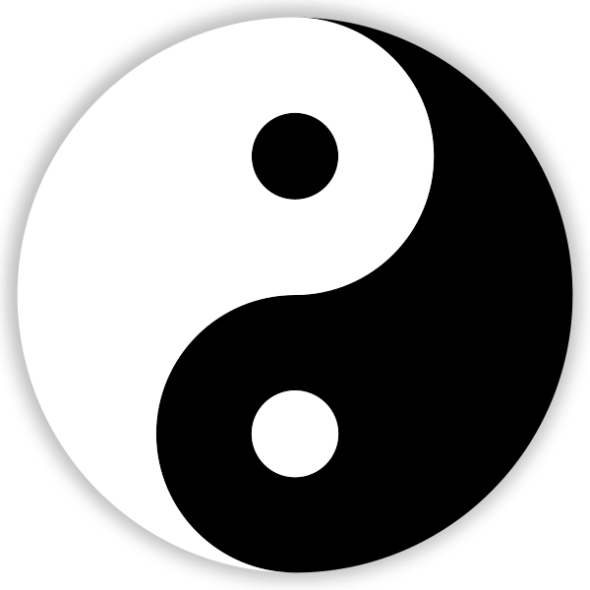Tags
Buckminster Fuller, creativity, inquiry, philosophy, Questions, Reality, Reflexivity, thoughts, Yin and Yan

“There are no stupid questions” has become an accepted cliche. But then again, you’ve never run into my flavor of “stupid” questions. Joking aside, I was never afraid of stupid questions. Rather it is some of the questions I have asked of myself in the past that scare me into thinking I might have lost it. I want to give you two such examples that scared me at first, only to find that others have thought those same apparently crazy thoughts. Which is not to say I am not crazy, but rather than I am not the only crazy one. And that my friends, sits just fine with me!
Let me time-teleport you with a younger version of myself, laying sleeplessly in bed on a dark night about thirteen years ago. I decided to really challenge myself with the toughest question I could invent. Being that it was night and dark, my mind of course jumped to alien abductions. I asked myself: if aliens suddenly abducted me that very night, and decided to see how smart the human race really is, what would they ask me?
First I decided that advanced aliens might have an inclination to efficiency and so they would deduce humanity’s level of intelligence through one question alone. The question came to me right away: the aliens would ask me to chose only one word that best describes everything I know about everything. Not quite happy yet, I decided to actually try to answer the made-up abductors’ question. After thinking for about five minutes, I settled on the word “cyclical” – after all, there is a cycle to everything I could think of. So for the next ten years I would think about my answer. All this time I thought it was a stupid mind game to have played in the first place. That is until I came upon the Unified Theory of Cycles which proposes that the entire reality can be described through cycles within cycles and I got shivers down my spine. Only afterwards did a warm and reassuring feeling that I am not the only one come over me – in this case Stephen J. Puetz was my partner in crime.
Thirteen years later you can imagine the type of question I would ask myself would be much crazier still. So lo and behold, about two months ago I came up with a question to beat all questions for myself and again scared myself in the process. I basically said, if humans are unique and their perspectives subjective, then how can there be the convergence we often observe around foundational insights? If the world is made up of foundational (i.e. absolute) insights, then how can there be relativity of opinion and perception? Is reality objective or subjective, and can it be both? Now you’ll say there’s nothing scary about this question, it kinda falls under the normal range of philosophical inquiry. But wait till you hear the answer I came up with. I basically jumped straight to answering by describing an ultimate convergence of knowledge that is both absolute and relative. I decided that the ultimate converge of all knowledge and wisdom would have to resemble a reflexive relationship between a minimum of two foundational elements, one absolute (truth), and the other relative (love). By reflexivity in this case I mean that one element would be described through the other, which in turn would describe the first: it’s easy if you think Yin and Yang. And so, here’s my answer to the ultimate convergence of all knowledge of reality that allows for both absolutism and relativity to not only co-exist, but achieve meaning each through the other: love is true, and truth is love. This was my answer, and after coming up with it, I of course agreed with myself that I had this time for sure lost it – I never took a philosophy course in my life, and here I am jumping right over what even edgy philosophers might dare. There was that little red devil on the shoulder telling me that this is a perfectly normal answer, but the white angel said: “consult a psychologist, quickly, while there is time!.” Listening to the white angel on the shoulder as we always tend to do, I put the entire subject away in a mental drawer that I was uneasy about ever opening again. That is until I came across R. Buckminster Fuller’s wisdom today, and shivers ran down my spine one more time. Why? Because believe it or not, Fuller has said something strangely resemblant of my answer. I’ll reproduce here two of Fuller’s quotations that raised my eyebrows and let you draw your own conclusions: “Relativity is inherently convergent, though convergent toward a plurality of centers of abstract truths. Truth is a relationship“, and “Unity is plural and, at minimum, is two“.
As far as I am concerned I do believe that in Buckminster Fuller I have finally found my intellectual idol – it’s only natural since his insights reassured my most intimate thoughts to date. But had I run into his wisdom prior to the “crazy” absolutism vs. relativity question, I likely would not have appreciated the true depth of his perspective. So, given my personal experiences over the last thirteen years, I would redefine the popular cliche with “there is no crazy question”. The crazier still answers to those already crazy questions might just come in very handy, no matter how abstract and useless they may seem at the time they are conceived.
So what about the reocurring meta question about my own sanity? Well, in light of Fuller’s dualism I would dare an answer: yes I am a little crazy, but only in the sanest sense of the word!
